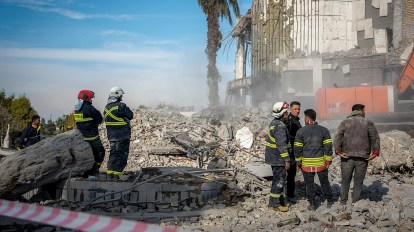According to a statement from the Foreign Ministry in Islamabad, Pakistani Foreign Minister Jalil Abbas Jilani warned his Iranian counterpart during a conversation on Wednesday that any unilateral action may jeopardize regional peace and security.
Pakistan and Iran have long been targets for anti-Iranian groups seeking independence for Iran‘s eastern Sistan and Pakistan’s southwestern Baluchistan provinces. The group Jaish al-Adl, consisting of members from the ethnic Baluch community, aims for a fairer share of resources and wealth in the provinces. Pakistan insists the group has no organized presence in the region, but acknowledges potential militants in remote areas. Separatists and nationalists complain of discrimination and long-standing suspicions over militant attacks between Iran and Pakistan.
Jaish al-Adl: What is it?
Often referred to as the “Army of Justice,” Jaish ul-Adl is a Sunni Salafi separatist terrorist group that mostly functions in southeast Iran. There is a sizable Sunni Baluchi community in this area, and there is a porous border with Pakistan. The group’s primary goals are to fight for the independence of the Sistan and Baluchistan Province and to win more rights for the Baluch people. They have been responsible for many assaults against military personnel in Iran.
Jaish ul-Adl’s connection to Ansar Al-Furqan, another Iranian Baloch Sunni military organization that operates within Iran, is one of its most prominent characteristics. The Iranian security forces face a serious threat as a result of this alliance’s expansion and strengthening of their capabilities.

However, Jaish ul-Adl, a Sunni militant and Baluchi separatist organization, operates primarily in southeastern Iran, with a significant Sunni Baluch population and a porous border with Pakistan. The group claims responsibility for attacks on military personnel in Iran and is fighting for the independence of Sistan and Baluchistan Province and greater Baluch rights. It maintains ties with Ansar Al-Furqan, another Iranian Baloch Sunni armed group operating in Iran.
Attacks, Bombings, and Ambush of Jaish al-Adl
Iran launched missiles and drones into Pakistan’s Balochistan province, aiming at the Sunni separatist group Jaish al-Adl, or Army of Justice. Balochistan’s southwestern province has a porous border with Iran’s Sistan and Baluchistan province. Locals claim Jaish al-Adl has training camps in Kohe Sabz and the surrounding mountains. Pakistan-based researcher and journalist Fakhar Hayat Kakakhel identifies Jaish al-Adl as an anti-Shia outfit adhering to Salafi ideology and distributing propaganda on Telegram channels in Persian and English.

Besides, In 2013, Jaish al-Adl claimed responsibility for killing 14 Iranian border guards in Saravan, claiming it was in retaliation for 16 Iranian Baloch prisoners on death row. The group later attacked Musa Nuri’s vehicle in Zabol, killing at least two people. In February 2014, terrorists abducted five Iranian border guards in Sistan and Baluchistan, being transferred to Pakistan. Jaish al-Adl claimed responsibility for the kidnappings. In October, Iran’s state news agency reported that three members of Iranian security forces were killed by Jaish ul-Adl.
In January 2024, Iran claimed to have targeted Jaish ul-Adl’s headquarters with ballistic missiles and drones. Balochistan province has become a hotbed for terror attacks, with banned religious terror and separatist outfits using its soil to carry out attacks against Pakistan’s security personnel and installations. Iran’s state news agency reported that three Iranian security forces were killed by Jaish ul-Adl in October.
Following the incident occurred, Iran Targets Pakistani Terror Group Jaish Al-Adl
Iran launched missiles and drones into Pakistan’s Balochistan province, aiming at the Sunni separatist group Jaish al-Adl, or Army of Justice. Balochistan’s southwestern province has a porous border with Iran’s Sistan and Baluchistan province. Locals claim Jaish al-Adl has training camps in Kohe Sabz and the surrounding mountains. Pakistan-based researcher and journalist Fakhar Hayat Kakakhel identifies Jaish al-Adl as an anti-Shia outfit adhering to Salafi ideology and distributing propaganda on Telegram channels in Persian and English.

Pakistan-based Jundullah, an offshoot of Pakistan-based Jundullah, has been involved in numerous attacks targeting Iranian security forces. In 2012, Jaish al-Adl emerged and claimed responsibility for an attack on a police station in Rask, Sistan, and Baluchistan, killing 11 Iranian security personnel. Iranian Interior Minister Ahmad Vahidi warned Pakistan to stop Jaish al-Adl from attacking Iran. Iran shares a 900-kilometer border with Pakistan, guarded by security forces on both sides.
The group has been involved in rampant smuggling of goods, particularly Iranian petrol and diesel. Iranian Foreign Minister Hossein Amir-Abdollahian defended his country’s strike inside Pakistan, stating that the target of the cross-border airstrikes was “Iranian terrorists present on Pakistani soil.” Pakistan’s Foreign Ministry stated that the attack was a serious breach of Pakistan’s sovereignty and an egregious violation of international law and the spirit of bilateral relations between Pakistan and Iran.












